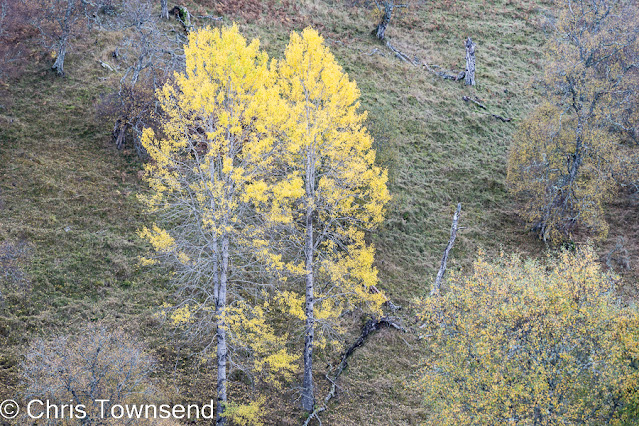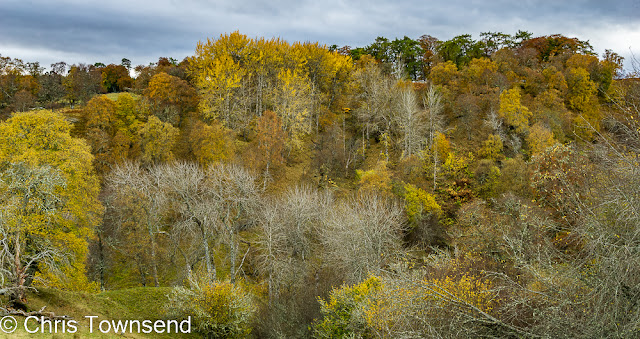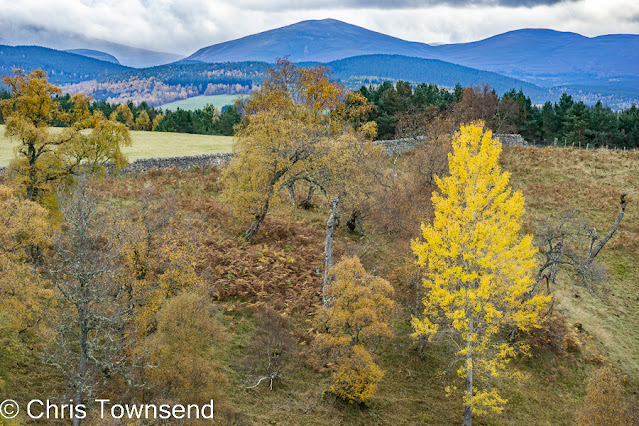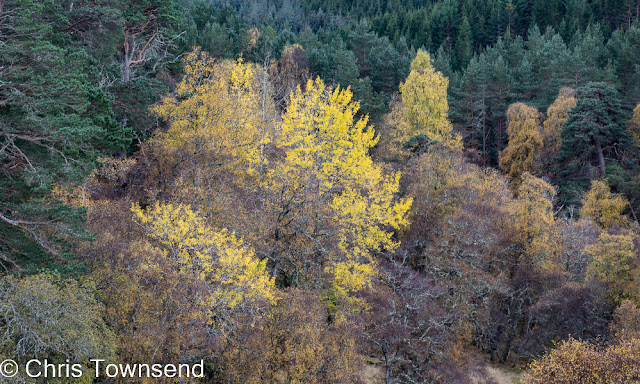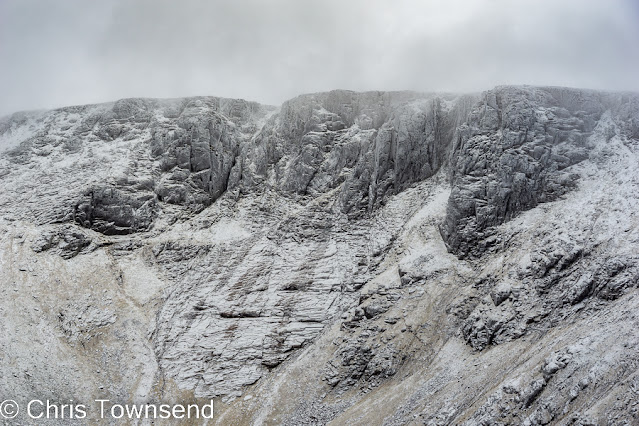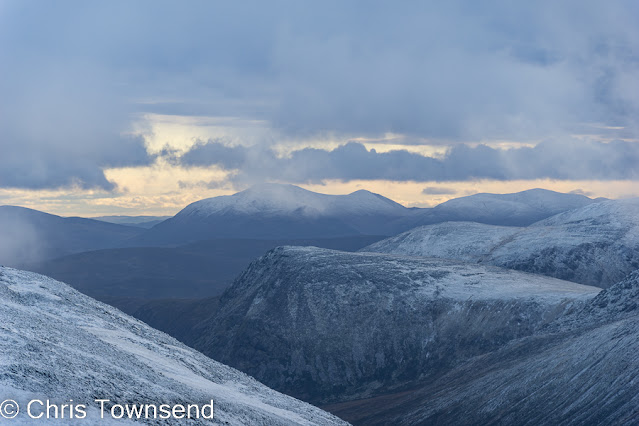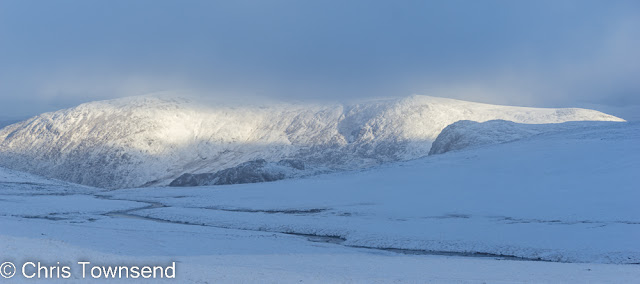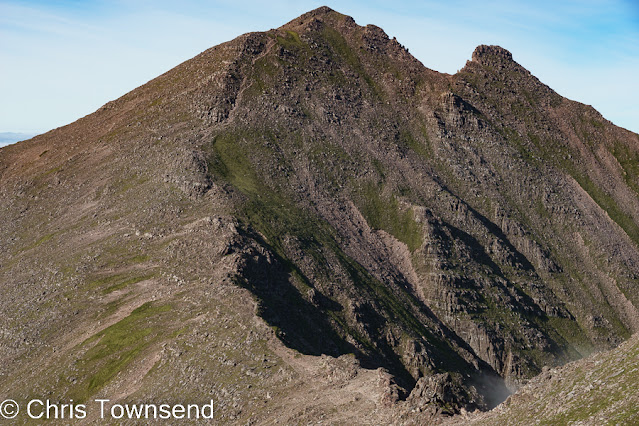 |
Bidein a' Ghlas Thuill, An Teallach
|
Last year I began an occasional series of trip reports
with the emphasis on the key gear used for The Great Outdoors. This is the third one, an early summer two-night trip to An Teallach. I've edited it slightly and updated
prices.
An Teallach is one of those mountains where the clouds seem
to gather as soon as I approach it. In many visits over 40 years I had seen
nothing. From other hills An Teallach shone in the sun from other hills but as
soon as I came near it always disappeared. One of my ambitions was to climb the
mountain, often rated as the finest in Scotland, when I could actually see it.
A good forecast gave me hope this summer and it did look
promising as I walked up beside the rushing waters of the Allt Airdeasaidh late
in the afternoon. The multiple summits of An Teallach stretched out ahead. I
camped at the head of the glen where there was a breeze I hoped would keep off
the midges and watched the summits sink into darkness and the clouds turn pink.
I felt excited for the next day.
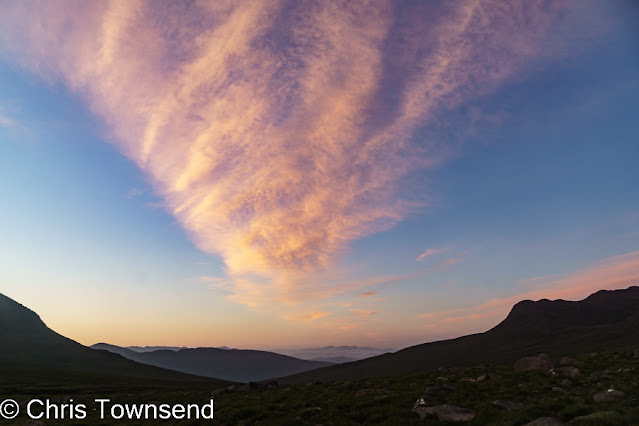 |
After sunset
|
Then during the night I woke to find I was camped in mist.
By morning it was even thicker. I was not pleased. Another day on An Teallach
without views? I decided to move camp nearer the mountain and hope there would
be a clearance. Up in Coire Mor an Teallaich I camped at 670 metres right under
the summits and still in the mist. I sat outside the tent over a long lunch.
Waiting.
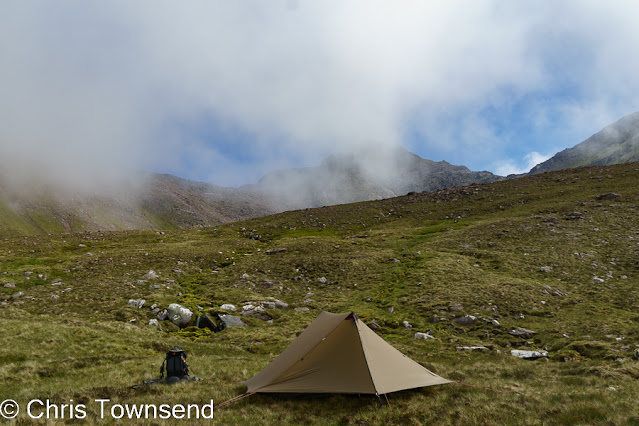 |
The mists begin to clear
|
At 3pm a touch of blue appeared high above. Then hazy peaks
with mist swirling round them. I had my pack ready and was away within minutes.
I climbed out of the cloud to hot sunshine, bright blue sky, and brilliant
views. Everything below about 700 metres was hidden in a white blanket. Looking
down I could see my tent appearing and disappearing as the mist. In the
distance dark jagged peaks rose out of the cloud, silhouetted against the deep blue
sky.
The full glory of the mountain was unveiled when I reached
Bidein a’ Ghlas Thuill, the highest of An Teallach’s two Munros. Ahead lay the
sharp peak of the second Munro, Sgurr Fiona, and the jagged pinnacles of the
Corrag Bhuidhe. This is one of the most tremendous views in the Highlands. I
stayed on the warm summit for nearly an hour, just absorbing the scene, before continuing
to Sgurr Fiona. The reddish-brown sandstone rocks were warm in colour and warm
to touch.
 |
| Goats |
There were no other people about but there were plenty of
goats, clattering over the rocks and sunbathing on rock platforms. Their easy
movement over the rough, steep ground made me feel clumsy and uncoordinated.
One stood almost on the summit of Sgurr Fiona, gazing out over the mist. I
decided not to disturb him and stopped not far below the top.
Back in camp the mist lapped the tent. The night was chilly
and when I woke the summits were in cloud again. I didn’t mind. I’d had a
glorious day on An Teallach. Now I just had a gentle meander back down.
PLANNING & PREPARATION
This was a summer trip with a forecast for calm sunny
weather. However, I was venturing into wild country and planning on camping
fairly high up so I didn’t feel I could cut my load by too much. Also, as I was
intending to walk in and camp and then climb the hills with just a day load the
overall weight wasn’t critical. If I’d been going to backpack over An Teallach
I’d have wanted to really reduce the weight I carried and would probably have taken
a lighter tent, sleeping bag, and mat.
 |
First camp
|
The forecast for hot weather suggested a sun hat and
sunscreen would be a good idea plus ample water bottles, especially as I knew
there was no water up on An Teallach. Calm weather meant midges would probably
be a problem – they weren’t, I think it was too dry – so insect repellent,
mosquito coils, and head net all went in the pack.
If the forecast was correct I wouldn’t need much in the way
of clothing, except maybe in camp if it was chilly early and late. I reckoned a
light insulating layer and a windshirt could deal with that. I did take
lightweight waterproofs – the weather in the Highlands can change unexpectedly
and anyway I just don’t feel happy without them.
EQUIPMENT
PACK
Sierra Designs Flex
Capacitor 40-60L 1.23kg £175 ****1/2
Best Buy
Likes lightweight,
adjustable capacity, cost
Dislikes only two back lengths
Capacity 60 litres
Materials 100D Nylon-Poly Ripstop/420D Nylon Oxford
Closure zipped lid
Back system two sizes, curved DAC Pressfit
Aluminium frame, scapular & lumbar pads
Back length 61cms (M/L), 55cms (S/M)
Compartments one
Pockets 1 lid, 2 stretch side, 2 stretch
shoulder strap, 2 hipbelt, mesh hydration sleeve
Features side/front compression
straps, ice axe/trekking pole straps
This has been a
favourite pack for several years. It’s lightweight, stable, and comfortable. I
knew it would handle a heavier and bulkier load than I’d be carrying on this
trip as I’d carried it with much more inside for a month in the Colorado
Rockies. I could have chosen a lighter pack but the Flex Capacitor has one big
advantage for this type of trip – the ability to reduce the volume easily for
use with a small load. With the four front straps cinched tight and the side
straps pulled in it closes firmly round the contents so they don’t shift about and
the pack remains stable. This was important for the steep rocky terrain high on
An Teallach where I didn’t want a pack that might throw me off balance. As it
was the Flex Capacitor performed well for both the backpacking and day walking
parts of the trip.
TENT
Hilleberg Anaris 1.4kg
£705 ***** Best Buy
Likes roomy, stable,
good ventilation, lightweight
Dislikes expensive
Outer Kerlon 1000 20D silicone Ripstop
Nylon 5000mm hydrostatic head
Inner mesh doors, 10D nylon roof
Groundsheet PU 50D nylon, 12000mm hydrostatic head
Poles none, uses trekking poles
Porches 2
Inner
Dimensions 220 x 120 cm, 41cm high in centre
The Anaris is a
lightweight two-person tent. I could have taken something a bit lighter but I prefer
roomy shelters and weight wasn’t critical. The Anaris is designed for just the
conditions I was expecting too. With big mesh inner doors, porches on both
sides, and a flysheet that doesn’t come right down to the ground it has
excellent ventilation, making condensation less likely. As it was, the latter
was minimal as it was so dry. At the same time I knew it would withstand wind
and rain if the weather changed. It pitches with trekking poles, which did mean
I wouldn’t have these for the walk up An Teallach. On rocky terrain poles can
sometimes be a nuisance anyway and I reckoned I wouldn’t miss them. And I
didn’t. Another bonus of the Anaris was the big porch doors which meant I could
lie in the inner and look out at the mountains and the sky. As it stayed dry
and there was never more than a light breeze I only closed the outer doors when
I went up An Teallach.
SLEEPING BAG
Nemo Riff 30 930 grams £350
****1/2 Recommended
Likes roomy shape, ventilation, lightweight
Dislikes draft collar
Fill 280g 800fp hydrophobic RDS down
Shell 20D Nylon Ripstop
w/ DWR outer, 30D
Nylon Taffeta w/ DWR lining, 40D
Nylon Ripstop OSMO™ w/ DWR
footbox
Construction box wall
Zip two-way 3/4
Sizes Men:
Regular, Long Women: Regular, Long
Rating -1°C
As with the tent I
could have taken a lighter sleeping bag. However, I had this down one on test
and I’d really liked the roominess on my initial trial so I decided to take it.
Rather than mummy-shaped the Riff 30 is more like an hourglass, being wider at
the elbows and knees. The idea is those of us who don’t sleep on our backs can
stretch out and feel comfortable. It works too and I love the freedom the
design gives. The Riff 30 also has two zipped panels on the front. Unzip these
and you have a little more room and two uninsulated sections for coolness. I
didn’t need these on this trip as the nights weren’t that warm with overnight
lows of 10°C and 5°C. With the front zips closed I was perfectly warm, as I’d
expect with a bag with this rating.
SLEEPING MAT
Nemo Tensor Insulated 480 grams £180 **** Recommended (tentatively)*
Likes comfort, packs small
Dislikes not that light
Type insulated
air bed
Shell 20D PU
polyester
Insulation 2 layers suspended metalized film
Dimensions 183 x 51cm
Thickness 8cm
Rating R-Value 3.5, all season
Taking this mat was
definitely to choose comfort over weight. I really didn’t need a mat that
should be warm down to -10°C in a Scottish summer. For an insulated mat the
Tensor isn’t actually heavy but there are plenty of lighter ones suitable for
summer use. However, I had this to test and just lying on it at home told me
that it was very comfortable. It has a grid pattern rather than tubes and this
gives when you move – I never felt I would roll off. It inflates easily by
mouth – there is a pump stuffsack if you want one. Packed it’s small for an
insulated mat.
I enjoyed the
comfort, which is really quite luxurious. I don’t yet know how warm it actually
is though. I’ll find out in the winter. In the meantime, I can certainly
recommend it for comfort. There are also mummy-shaped regular and short
versions that weigh less. My first choice would be for one of these.
*The mat was returned to Nemo so I never did find out how warm it is.
CLOTHING
BAM Air Fitted Boxer
& BAM Ramble T-shirt 175 grams (T-shirt) £18 & £29 ****1/2 Recommended
Likes soft
fabric, very comfortable, low cost
Dislikes slow drying compared to synthetics
Fabric 68% bamboo viscose/28% organic cotton/4%
elastane
Sizes men S-XXXL
Strenuous walking
in hot weather really challenges next-to-skin clothing both in terms of comfort
and smell. Some materials work fine for a day but then need washing before
they’re fit to wear again. Bamboo viscose clothing isn’t like that. In hot
weather it’s very comfortable and stays that way for several days. On this trip
both t-shirt and boxer shorts were fine. They did get soaked in sweat and
didn’t dry as fast as some 100% synthetics do. However, they still felt
comfortable and in the hot weather being a little damp didn’t matter. Whilst
neither item smelt much after the trip the t-shirt in particular was badly
sweat-stained.
Klattermusen Njoran
2.0 Hoodie 365 grams £200 ****
Recommended
Likes stretchy, comfortable, hoodDislikes quite expensive
Materials 51% recycled polyester/49% polyester
Pockets 2 hand
Cuffs double-fabric
Hem extended back, shockcord
Sizes men XS-XXL, women XXS – XL
This lightweight
mid-layer is designed for summer and was all I needed for warmth on this trip.
In fact, I only wore it in camp early in the morning and late in the evening
when it was a little chilly. I wouldn’t go without something like this though
even in summer. The fabric is soft and comfortable and very stretchy. I like
the hood which can be pulled up quickly for extra warmth and the pockets which
sit high enough to be used when wearing a hipbelt. The sleeves are long – I can
pull the cuffs over my hands. I’ll be wearing this in cooler weather under a
wind or waterproof and I expect it to perform very well.
Picture Organic Wailer
windshirt 165 grams £119.90 ***1/2
Likes lightweight, recycled
fabricDislikes not that breathable
Fabric recycled polyester with Teflon
EcoElite PFC free DWR
Front
closure ½ length YKK water-resistant
zip with inner flap
Hood elasticated rim
Pocket front pouch with
water-resistant zip
Cuffs elasticated
Hem drawcord
Sizes men S-XXL
A windproof top is often my most-worn garment after my base layer
and so it proved on this trip even though I didn’t wear it very often, mostly just
in camp when my t-shirt was not quite warm enough and for walking from my first
camp to the second in a breeze. It resisted this breeze okay and on other trips
has been fine in stronger winds. The fabric is thin. It has a distinctive
appearance with its black and white pocket. This isn’t a different fabric
though, it’s just cosmetic.
The fabric has a slick feel and is quite comfortable. It’s not
that breathable though. On the short and not that strenuous walk between my two
camps I did get a fair amount of condensation inside. This did dry quickly once
I stopped. Picture Organic gives it 5/10 for breathability and 5/10 for
waterproofness. As I always carry a fully waterproof top anyway, I’d rather
have less waterproofing and better breathability. For short strolls where a
shower is possible, and you don’t want to carry a waterproof the Wailer should
be fine. I wouldn’t rely on it alone in the hills though.
The Wailer is quite light but has fairly hefty water-resistant
zips. I think much lighter more flexible zips would be better given that it
isn’t fully waterproof. I like the big map-size pouch pocket. The garment can
be stuffed into this for packing. The cuffs don’t allow any ventilation but are
stretchy enough for the sleeves to be pushed up if necessary. The hood is
quite-close fitting and stays on in a breeze.




